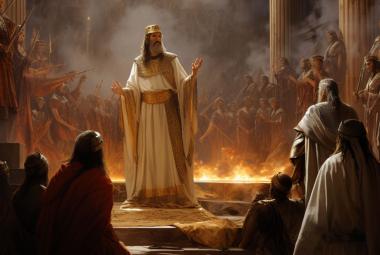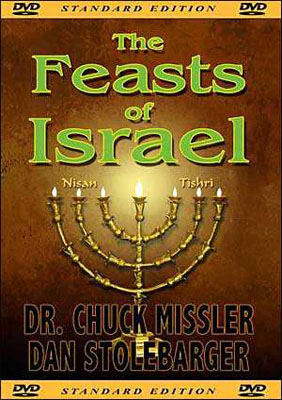On June 6th (the 6th of Sivan on the Hebrew calendar) the Jews will celebrate Hag HaShavuot, the Feast of Weeks, or Pentecost. This comes from Leviticus 23:16, which points to "the morrow after the seventh sabbath" after the Feast of First Fruits (thus, 50 days-in Greek, pentecost.)1
This is one of the three (of the seven) feasts of Moses which was compulsory for every able-bodied male to attend.2 This seems to indicate that these three were of particular significance.
The Feast of Weeks is associated with the giving of the Law in Exodus 19, which can be rationalized as occurring on the 6th of Sivan. This feast is also called the Feast of Revelation.3 There is also a tradition that David died on the 6th of Sivan.
Prophetic Implications
The seven Feasts of Moses are not only commemorative, they are also prophetic.4 The first three, in the month of Nisan, are predictive of the First Coming of Jesus. The last three, in the month of Tishri, are associated with His Second Coming. It is this one, in between, which is associated with the Church.5
The Birth of the Church appears to be a fulfillment of the Feast of Pentecost, or Shavuot . Jesus predicted it,6 and it was also fulfilled precisely on the Feast of Pentecost. 7 It is interesting that this is the only Feast of Moses in which leavened bread is allowed, which seems to give it a Gentile flavor! (Leaven is always a "type" of sin. Jesus and Paul both used it in this way.8 It corrupts by puffing up.)
The Book of Ruth
The Jewish traditions on the Feast of Weeks include the reading of the Book of Ruth. This small, four-chapter book is one of the most remarkable jewels in the Old Testament. It is a love story that is venerated among literature buffs for its sheer elegance. Ruth, a Moabitess, in her loyal dedication to Naomi (her widowed mother-in-law), after her own husband dies returns with Naomi to Bethlehem where she ultimately marries Boaz, a wealthy landowner, who is the hero of the piece.
The book is also treasured among Bible students because it gives us an unparalleled glimpse into the life and customs of ancient Israel. The laws concerning gleaning,9 the redemption of property, 10 and the laws concerning the levirate marriage 11 are all beautifully illustrated by the narrative.
But it may come as a surprise to New Testament believers that it is also a key book of prophecy, without which one has little chance of really understanding the Book of Revelation. The story illustrates the role of a goel , the kinsman-redeemer, who returns the land lost to Naomi by performing the requirements of redemption.12 He also takes for himself a Gentile bride who is destined to appear in the family tree of David and of Jesus Christ.
The exquisite parallels have been well recognized by many Biblical scholars: Naomi (typifying Israel) returning to the land, and Ruth (typifying the Bride of Christ), each established by the act of redemption by the kinsman-redeemer Boaz What is remarkable is how even the subtle details of the Book of Ruth seem to support the "typological" view.
Ruth learns of the pattern (God's design) of redemption through Naomi. The church learns of God's redemptive design through Israel. Ruth is introduced to Boaz by an unnamed servant. The Holy Spirit is always modeled in the Old Testament types as the "unnamed servant." 13 Jesus told us that the Holy Spirit would never testify of Himself.14 Naomi learns of Boaz through Ruth. Is there a witness burden here for the church? And where is Ruth during the threshing floor scene? At Boaz's feet! The threshing floor is one of the idioms which can allude to the tribulation. One cannot build doctrine from "types," but they can be instructive. The list goes on and on. Every time we study this book it seems there are additional "discoveries."
It is interesting that this book can be viewed as prophetic of the Church, which was "hidden" in the Old Testament. And it is interesting that, even among the Jewish community, this book is associated with the Feast of Pentecost. Most writers assume that the Feast of Pentecost was completely fulfilled in Acts 2.15 But maybe there's still more to come.
Enoch Traditions
It is interesting that there is a rabbinical tradition that Enoch was born on the 6th of Sivan. Enoch is an extremely interesting mystery in the Old Testament. (The first prophecy by a prophet in the Bible is a prophecy of the Second Coming of Jesus Christ,16 uttered by Enoch before the flood of Noah!) There were three groups of people facing the judgment of the flood of Noah:
- Those that perished in the flood;
- Those that were preserved through the flood (in the Ark);
- Those that were removed prior to the judgment of the flood.
There are some who suggest that Enoch might be a foreshadowing of the removal prior to judgment, in contrast to Noah and his family who were protected through it.
The Trumpet of God
Paul mentions the "Trumpet of God" in connection with the Rapture. 17 It is interesting that this term appears only twice in the Bible: at the Rapture and at the giving of the Law at Sinai. 18 (Don't confuse the "Trumpet of God" with the temple trumpets or the shofar. Remember these trumpets continue during the Millennium, so they aren't "the last trump.") Could both of these references to the "Trumpet of God" be connected with the 6th of Sivan?
The Feast of Harvest
Another name for the Feast of Weeks is Hag Ha Kazir , the Feast of Harvest, since it is celebrated at the time of the "first harvest." It is interesting that Jesus frequently used "the harvest" as an idiom to refer to the ingathering of believers.19
An Interval in God's Plan for Israel
In the famed Seventy Week prophecy in Daniel 9, where the Angel Gabriel outlines God's plan for Israel, we find four key verses:
- 9:24 The scope of the prophecy;
- 9:25 69 weeks (of years), climaxing in the presentation of the Messiah the King;
- 9:26 An interval between the 69th and the 70th week;
- 9:27 70th week.
(See our briefing package The Seventy Weeks of Daniel for a review of this most amazing passage in the Bible.)
It appears that the sequence of events regarding Israel directly is interrupted for a period of time. This interruption appears to be associated with Israel's rejection of the Messiah20 and God's program for Israel is then resumed at the completion of the Church.21
Paul tells us that the Church is a mystery not revealed in the Old Testament22 and if we examine the Scriptures carefully we can find this mysterious interval suggested throughout the Bible. 23 The day is approaching when the Church is "complete" and God will remove it and again continue with His program with Israel. Is it possible that His "clock" will restart on the 6th of Sivan, the very day that it was halted?
Caveat
While these conjectures are fun to explore, let's remember they are always just conjectures. We don't believe in setting dates: we are to expect Him at any moment. "For in such an hour as ye think not the Son of Man commeth."
The Master Counter
Paul tells us that there will be a time coming when the "fulness of the Gentiles" will be complete.24 There is apparently a heavenly tally counter that is yet to be full, or complete. It seems that every time someone trusts the Lord Jesus for their salvation, that counter is incremented by one. Someday, when it is finally complete, the Father will say to the Son, "Go get them!" But only He knows the completing number; no one else does.25
Satan also knows of this counter but not the final number when it will be complete. Every time someone comes to Jesus, Satan doesn't know whether or not the counter is finally full! When it is, and the Rapture occurs, he knows that he has but a little time to unfold his final schemes. (Do you realize that for almost 2,000 years, Satan has been in shock treatment? We can understand why he is so anxious for each of us to be unfruitful: he will do anything to slow down the counter!)
Our Opportunity
Every day that the Lord tarries is another day for us to do His work, to share His blessings, and to pray for our unsaved loved ones. Have you taken the imminent return of the Lord Jesus seriously? Are you personally really ready? Is this just a conceptual acknowledgment or is it the active dynamic in your personal life? How about in your professional life? Or your family life?
Isn't it time to take the Bible seriously? Isn't it time to take Him seriously? Or are you one of the ones remaining to complete the counter who are holding all the rest of us up?
Notes:
- The celebration of Shavuot on the 6th of Sivan is actually based on an error. The Feast of First Fruits is to be "on the morrow after the sabbath"-i.e., Sunday. Shavuot is to be on the morrow after the 7th sabbath, again, always on a Sunday (Lev 23:15-22). Tradition has, again, replaced the specific teaching of the Scripture.
- Deut 16:16.
- Since the Passover was on the 14th of Nisan, and there were 3 days to the Red Sea crossing, then 46 days into the wilderness, and 3 days of Moses' preparation, this is deemed to correspond to the 49 days interval between Feast of First Fruits (17th of Nisan) and the 6th of Sivan.
- Col 2:16,17.
- See our briefing package The Feasts of Israel .
- Jn 14:25,26; Acts 1:8.
- Acts 2:1-47.
- Mt 16:6; Lk 13:21; 1 Cor 5:6-8; Gal 5:7-9.
- Lev 19:9-10; 23:22.
- Lev 25:23-34.
- Deut 25:5-10.
- Cf. Jer 32:6-27; Rev 5:1-11.
- Gen 24.
- Jn 16:13.
- It is interesting to carefully compare Acts 2 with Exodus 19, both of which apparently occurred on the 6th of Sivan.
- Jude 14,15.
- 1 Thess 4:16.
- Ex 19:13, 16, et al.
- Mt 12:29-30; 3:12; 2 Thess 2:1.
- Lk 19:42.
- Rom 11:25.
- Eph 3:3-7.
- Lk 4:18,19 vs Isa 61:1, 2 (note omission); Zech 9:9-10; Rev 12:5, 6; et al. 24 times in all.
- Rom 11:25.
- Mk 13:32.







